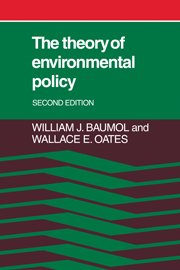Book contents
- Frontmatter
- Contents
- Preface to the second edition
- Preface to the first edition
- 1 Introduction: economics and environmental policy
- PART I On the theory of externalities
- PART II On the design of environmental policy
- 10 Introduction to Part II
- 11 Efficiency without optimality: the charges and standards approach
- 12 Marketable emission permits for protection of the environment
- 13 Stochastic influences, direct controls, and taxes
- 14 Taxes versus subsidies: a partial analysis
- 15 Environmental protection and the distribution of income
- 16 International environmental issues
- 17 National or local standards for environmental quality?
- Index
12 - Marketable emission permits for protection of the environment
Published online by Cambridge University Press: 05 June 2012
- Frontmatter
- Contents
- Preface to the second edition
- Preface to the first edition
- 1 Introduction: economics and environmental policy
- PART I On the theory of externalities
- PART II On the design of environmental policy
- 10 Introduction to Part II
- 11 Efficiency without optimality: the charges and standards approach
- 12 Marketable emission permits for protection of the environment
- 13 Stochastic influences, direct controls, and taxes
- 14 Taxes versus subsidies: a partial analysis
- 15 Environmental protection and the distribution of income
- 16 International environmental issues
- 17 National or local standards for environmental quality?
- Index
Summary
In the preceding chapter, we examined the case for a system of effluent fees for the attainment of a set of predetermined environmental standards. We found, in particular, that such a fee system has the capacity to achieve the standards at the least cost to society. There is, however, an interesting, and in certain circumstances, an appealing alternative to fees that also possesses the least-cost property: a system of marketable emission permits.
While economists were making the case for effluent fees in the 1960s, a political scientist at the University of Toronto, J. H. Dales, published a small volume in which he proposed, as an alternative to fees, a system of tradable property rights for the management of environmental quality. Basically, Dales proposed that property rights be defined for environmental resources and then offered for sale to the highest bidder. For example, the environmental authority might create a limited number of permits for the discharge of a specified air or water pollutant; these permits would then be sold through some kind of auction.
It is easy to see that such a system can be used to achieve a specified environmental target and can do so, like fees, at minimum cost. In brief, the environmental authority can directly limit waste discharges to their target level by restricting the quantity of permits. As a market for these permits develops, a market-clearing price would emerge that (like a fee) will indicate to polluters the opportunity cost of waste emissions.
- Type
- Chapter
- Information
- The Theory of Environmental Policy , pp. 177 - 189Publisher: Cambridge University PressPrint publication year: 1988
- 2
- Cited by

